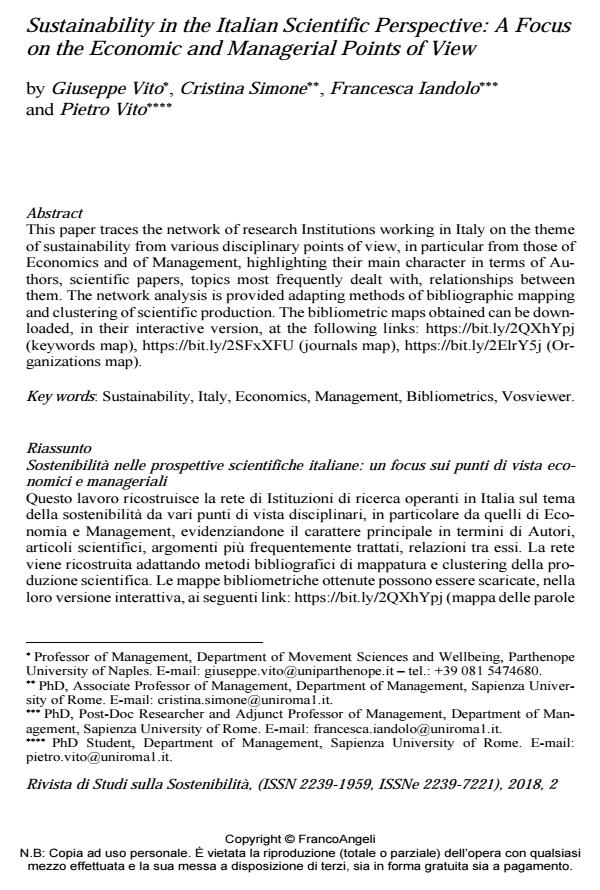Sustainability in the Italian Scientific Perspective: A Focus on the Economic and Managerial Points of View
Titolo Rivista RIVISTA DI STUDI SULLA SOSTENIBILITA'
Autori/Curatori Giuseppe Vito, Cristina Simone, Francesca Iandolo, Pietro Vito
Anno di pubblicazione 2019 Fascicolo 2018/2
Lingua Inglese Numero pagine 18 P. 9-26 Dimensione file 287 KB
DOI 10.3280/RISS2018-002002
Il DOI è il codice a barre della proprietà intellettuale: per saperne di più
clicca qui
Qui sotto puoi vedere in anteprima la prima pagina di questo articolo.
Se questo articolo ti interessa, lo puoi acquistare (e scaricare in formato pdf) seguendo le facili indicazioni per acquistare il download credit. Acquista Download Credits per scaricare questo Articolo in formato PDF

FrancoAngeli è membro della Publishers International Linking Association, Inc (PILA), associazione indipendente e non profit per facilitare (attraverso i servizi tecnologici implementati da CrossRef.org) l’accesso degli studiosi ai contenuti digitali nelle pubblicazioni professionali e scientifiche.
This paper traces the network of research Institutions working in Italy on the theme of sustainability from various disciplinary points of view, in particular from those of Economics and of Management, highlighting their main character in terms of Authors, scientific papers, topics most frequently dealt with, relationships between them. The network analysis is provided adapting methods of bibliographic mapping and clustering of scientific production. The bibliometric maps obtained can be downloaded, in their interactive version, at the following links: https://bit.ly/2QXhYpj
Questo lavoro ricostruisce la rete di Istituzioni di ricerca operanti in Italia sul tema della sostenibilità da vari punti di vista disciplinari, in particolare da quelli di Eco-nomia e Management, evidenziandone il carattere principale in termini di Autori, articoli scientifici, argomenti più frequentemente trattati, relazioni tra essi. La rete viene ricostruita adattando metodi bibliografici di mappatura e clustering della produzione scientifica. Le mappe bibliometriche ottenute possono essere scaricate, nella loro versione interattiva, ai seguenti link: https://bit.ly/2QXhYpj (mappa delle parole chiave), https://bit.ly/2SFxXFU (mappa delle riviste), https: // bit.ly/2ElrY5j (mappa delle organizzazioni).
Parole chiave:Sostenibilità, Italia, economia, gestione, bibliometria, vosviewer.
Giuseppe Vito, Cristina Simone, Francesca Iandolo, Pietro Vito, Sustainability in the Italian Scientific Perspective: A Focus on the Economic and Managerial Points of View in "RIVISTA DI STUDI SULLA SOSTENIBILITA'" 2/2018, pp 9-26, DOI: 10.3280/RISS2018-002002